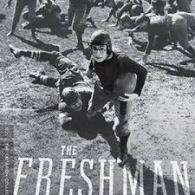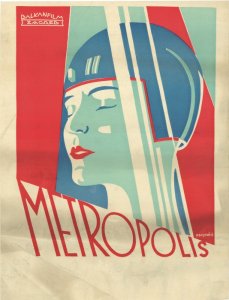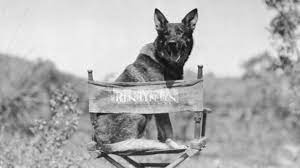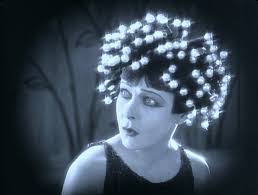3 July
 Speedy (Dir. Ted Wilde, US, 1928) (Screening format – not known, 86mins) Harold Lloyd’s final silent film sees him reprise his ‘glasses character’ as a baseball-obsessed New Yorker (the film features a
Speedy (Dir. Ted Wilde, US, 1928) (Screening format – not known, 86mins) Harold Lloyd’s final silent film sees him reprise his ‘glasses character’ as a baseball-obsessed New Yorker (the film features a  cameo from the legendary Babe Ruth) who becomes determined to save the city’s last horse-drawn streetcar, motivated in no small part by its owner being the grandfather of his love interest. Filled with Lloyd’s trademark rapid-fire visual humour and elaborate set-ups, it’s a fine example of his innovative approach to comedy. Find out more at allmovie.com. With live musical accompaniment by The Lucky Dog Picturehouse. Wilton’s Music Hall, London Link
cameo from the legendary Babe Ruth) who becomes determined to save the city’s last horse-drawn streetcar, motivated in no small part by its owner being the grandfather of his love interest. Filled with Lloyd’s trademark rapid-fire visual humour and elaborate set-ups, it’s a fine example of his innovative approach to comedy. Find out more at allmovie.com. With live musical accompaniment by The Lucky Dog Picturehouse. Wilton’s Music Hall, London Link
4 July
 The Freshman (Dir. Fred C Newmeyer, US, 1925) (Screening format – not known, 76mins) One of Harold Lloyd’s best feature-length comedies and his biggest hit, The Freshman features the bespectacled regular guy as Harold Lamb, a naïve young man who heads off to college believing campus life will be just as it is in the movies; he even learns a little dance he saw one of his favorite actors do in a film. However, Harold soon discovers that real life isn’t all that much like the pictures, and he quickly becomes the laughing stock of the university. Determined to prove himself, Harold tries out for the football team, but he serves as water boy and rides the pine until he finally gets a chance to redeem himself at the big game. Along the way, Harold also tries to woo a lovely co-ed, Peggy (Jobyna Ralston). Find out more at threemoviebuffs.com. With live musical accompaniment by The Lucky Dog Picturehouse. Wilton’s Music Hall, London Link
The Freshman (Dir. Fred C Newmeyer, US, 1925) (Screening format – not known, 76mins) One of Harold Lloyd’s best feature-length comedies and his biggest hit, The Freshman features the bespectacled regular guy as Harold Lamb, a naïve young man who heads off to college believing campus life will be just as it is in the movies; he even learns a little dance he saw one of his favorite actors do in a film. However, Harold soon discovers that real life isn’t all that much like the pictures, and he quickly becomes the laughing stock of the university. Determined to prove himself, Harold tries out for the football team, but he serves as water boy and rides the pine until he finally gets a chance to redeem himself at the big game. Along the way, Harold also tries to woo a lovely co-ed, Peggy (Jobyna Ralston). Find out more at threemoviebuffs.com. With live musical accompaniment by The Lucky Dog Picturehouse. Wilton’s Music Hall, London Link
8 July
 Echoes of the North; Four Chapters in Time This is a specially created film of rarely seen early 20th century archive footage shot around the North of England. It is accompanied by a new score – the first ever all-brass soundtrack for a silent film – composed by Neil Brand and performed by the world-famous Brighouse and Rastrick Band. Echoes of the North has been created in partnership with Yorkshire Film Archive, North West Film Archive, North East Film Archive, and Archive Film Agency. . Presented by the Yorkshire Silent Film Festival. With recorded score. Link
Echoes of the North; Four Chapters in Time This is a specially created film of rarely seen early 20th century archive footage shot around the North of England. It is accompanied by a new score – the first ever all-brass soundtrack for a silent film – composed by Neil Brand and performed by the world-famous Brighouse and Rastrick Band. Echoes of the North has been created in partnership with Yorkshire Film Archive, North West Film Archive, North East Film Archive, and Archive Film Agency. . Presented by the Yorkshire Silent Film Festival. With recorded score. Link
15 July
 Metropolis (Dir. Fritz Lang, 1927) (Screening format –not known , 149 mins ) Made in Germany during the Weimar period, Metropolis is set in a futuristic urban dystopia and follows the attempts of Freder (Gustav Frohlich), the wealthy son of the city’s ruler, and Maria (Brigitte Helm), a poor worker, to overcome the vast gulf separating the classes of their city. Filming took place in 1925 at a cost of approximately five million Reichmarks, making it the most expensive film ever released up to that point. It is regarded as a pioneering work of science fiction and is among the most influential films of all time. Following its world premiere in 1927, half an hour was cut from Fritz Lang’s masterpiece and lost to the world. Eighty years later a spectacular discovery was made when the footage was found in a small, dusty museum in Buenos Aires. The film was then painstakingly reconstructed and digitally restored so that at last audiences could see the iconic futuristic fairy tale as Lang had envisioned it. Find out more at silentfilm.org Presented by the Yorkshire Silent Film Festival. With live piano accompaniment by Jonny Best. Hull Truck Theatre, Hull Link
Metropolis (Dir. Fritz Lang, 1927) (Screening format –not known , 149 mins ) Made in Germany during the Weimar period, Metropolis is set in a futuristic urban dystopia and follows the attempts of Freder (Gustav Frohlich), the wealthy son of the city’s ruler, and Maria (Brigitte Helm), a poor worker, to overcome the vast gulf separating the classes of their city. Filming took place in 1925 at a cost of approximately five million Reichmarks, making it the most expensive film ever released up to that point. It is regarded as a pioneering work of science fiction and is among the most influential films of all time. Following its world premiere in 1927, half an hour was cut from Fritz Lang’s masterpiece and lost to the world. Eighty years later a spectacular discovery was made when the footage was found in a small, dusty museum in Buenos Aires. The film was then painstakingly reconstructed and digitally restored so that at last audiences could see the iconic futuristic fairy tale as Lang had envisioned it. Find out more at silentfilm.org Presented by the Yorkshire Silent Film Festival. With live piano accompaniment by Jonny Best. Hull Truck Theatre, Hull Link
16 July
 Echoes of the North; Four Chapters in Time This is a specially created film of rarely seen early 20th century archive footage shot around the North of England. It is accompanied by a new score – the first ever all-brass soundtrack for a silent film – composed by Neil Brand and performed by the world-famous Brighouse and Rastrick Band. Echoes of the North has been created in partnership with Yorkshire Film Archive, North West Film Archive, North East Film Archive, and Archive Film Agency. Presented by the Yorkshire Silent Film Festival. Link
Echoes of the North; Four Chapters in Time This is a specially created film of rarely seen early 20th century archive footage shot around the North of England. It is accompanied by a new score – the first ever all-brass soundtrack for a silent film – composed by Neil Brand and performed by the world-famous Brighouse and Rastrick Band. Echoes of the North has been created in partnership with Yorkshire Film Archive, North West Film Archive, North East Film Archive, and Archive Film Agency. Presented by the Yorkshire Silent Film Festival. Link
20 July
 Metropolis (Dir. Fritz Lang, 1927) (Screening format –not known , 149 mins ) Made in Germany during the Weimar period, Metropolis is set in a futuristic urban dystopia and follows the attempts of Freder (Gustav Frohlich), the wealthy son of the city’s ruler, and Maria (Brigitte Helm), a poor worker, to overcome the vast gulf separating the classes of their city. Filming took place in 1925 at a cost of
Metropolis (Dir. Fritz Lang, 1927) (Screening format –not known , 149 mins ) Made in Germany during the Weimar period, Metropolis is set in a futuristic urban dystopia and follows the attempts of Freder (Gustav Frohlich), the wealthy son of the city’s ruler, and Maria (Brigitte Helm), a poor worker, to overcome the vast gulf separating the classes of their city. Filming took place in 1925 at a cost of  approximately five million Reichmarks, making it the most expensive film ever released up to that point. It is regarded as a pioneering work of science fiction and is among the most influential films of all time. Following its world premiere in 1927, half an hour was cut from Fritz Lang’s masterpiece and lost to the world. Eighty years later a spectacular discovery was made when the footage was found in a small, dusty museum in Buenos Aires. The film was then painstakingly reconstructed and digitally restored so that at last audiences could see the iconic futuristic fairy tale as Lang had envisioned it. Find out more at silentfilm.org. Presented by the Yorkshire Silent Film Festival. With live musical accompaniment by Jonny Best (piano) and Trevor Bartlett (percussion). Link
approximately five million Reichmarks, making it the most expensive film ever released up to that point. It is regarded as a pioneering work of science fiction and is among the most influential films of all time. Following its world premiere in 1927, half an hour was cut from Fritz Lang’s masterpiece and lost to the world. Eighty years later a spectacular discovery was made when the footage was found in a small, dusty museum in Buenos Aires. The film was then painstakingly reconstructed and digitally restored so that at last audiences could see the iconic futuristic fairy tale as Lang had envisioned it. Find out more at silentfilm.org. Presented by the Yorkshire Silent Film Festival. With live musical accompaniment by Jonny Best (piano) and Trevor Bartlett (percussion). Link
22 July
 Echoes of the North; Four Chapters in Time This is a specially created film of rarely seen early 20th century archive footage shot around the North of England. It is accompanied by a new score – the first ever all-brass soundtrack for a silent film – composed by Neil Brand and performed by the world-famous Brighouse and Rastrick Band. Echoes of the North has been created in partnership with Yorkshire Film Archive, North West Film Archive, North East Film Archive, and Archive Film Agency. . Presented by the Yorkshire Silent Film Festival. Stoller Hall, Manchester Link
Echoes of the North; Four Chapters in Time This is a specially created film of rarely seen early 20th century archive footage shot around the North of England. It is accompanied by a new score – the first ever all-brass soundtrack for a silent film – composed by Neil Brand and performed by the world-famous Brighouse and Rastrick Band. Echoes of the North has been created in partnership with Yorkshire Film Archive, North West Film Archive, North East Film Archive, and Archive Film Agency. . Presented by the Yorkshire Silent Film Festival. Stoller Hall, Manchester Link
29 July
 Rin Tin Tin And Friends: Bring Your Dog Whether causing mayhem, saving the day, or just hanging around being dogs, the hound is a common sight in silent film. This specially created compilation of films will introduce you to some of the biggest stars of the silent era, including Jean the Vitagraph Dog, Luke the Bulldog, Teddy the Great Dane, Blair (the star of Rescued by Rover) and of course Rin-Tin-Tin. Although best known as a 1950s television character, Rin-Tin-Tin was a real dog. Rescued from a World War One battlefield in 1918 by an American soldier, he was brought to Hollywood and began appearing in films in 1922. After two appearances he got his first starring role one hundred years ago, and it was so successful that another 23 starring appearances followed. Presented by the Yorkshire Silent Film Festival. With live musical accompaniment by Will Pound (harmonica) and Jonny Best (piano). The screening is open to all good dogs and their owners. Winter Gardens, Morecambe. Link
Rin Tin Tin And Friends: Bring Your Dog Whether causing mayhem, saving the day, or just hanging around being dogs, the hound is a common sight in silent film. This specially created compilation of films will introduce you to some of the biggest stars of the silent era, including Jean the Vitagraph Dog, Luke the Bulldog, Teddy the Great Dane, Blair (the star of Rescued by Rover) and of course Rin-Tin-Tin. Although best known as a 1950s television character, Rin-Tin-Tin was a real dog. Rescued from a World War One battlefield in 1918 by an American soldier, he was brought to Hollywood and began appearing in films in 1922. After two appearances he got his first starring role one hundred years ago, and it was so successful that another 23 starring appearances followed. Presented by the Yorkshire Silent Film Festival. With live musical accompaniment by Will Pound (harmonica) and Jonny Best (piano). The screening is open to all good dogs and their owners. Winter Gardens, Morecambe. Link
 Slapstick For Children (And Their Adults) A 45 minute show which brings live-scored silent film alive for children, and includes opportunities to join in with making music and sound effects. Presented by the Yorkshire Silent Film Festival. With live piano accompaniment by Adam Fairhall and Jonny Best. Winter Gardens, Morecambe. Link
Slapstick For Children (And Their Adults) A 45 minute show which brings live-scored silent film alive for children, and includes opportunities to join in with making music and sound effects. Presented by the Yorkshire Silent Film Festival. With live piano accompaniment by Adam Fairhall and Jonny Best. Winter Gardens, Morecambe. Link
 Salome (Dir. Charles Bryant, US, 1923) (Screening format – not known, 74mins) This is a film adaptation of the Oscar Wilde play of the same name and is a loose retelling of the biblical story of King Herod and his execution of John the Baptist at the request of Herod’s stepdaughter, Salome, whom he lusts after. The film stars Alla Nazimova who, though largely forgotten today, was an international sensation in the early 20th century. Born in Yalta in 1879, she studied acting at Constantin Stanislavski’s Moscow
Salome (Dir. Charles Bryant, US, 1923) (Screening format – not known, 74mins) This is a film adaptation of the Oscar Wilde play of the same name and is a loose retelling of the biblical story of King Herod and his execution of John the Baptist at the request of Herod’s stepdaughter, Salome, whom he lusts after. The film stars Alla Nazimova who, though largely forgotten today, was an international sensation in the early 20th century. Born in Yalta in 1879, she studied acting at Constantin Stanislavski’s Moscow  Arts Theatre in the 1890s. In 1907, she found acclaim on Broadway, where her groundbreaking performances in European Modernist plays by Anton Chekov, August Strindberg and Henrik Ibsen generated millions of dollars. Six years later, Metro put Nazimova under contract at $13,000 per week, making her the highest-salaried actress in the industry. The highly stylized costumes, exaggerated acting, minimal sets, and absence of all but the most necessary props in Salome make for a screen image much more focused on atmosphere and on conveying a sense of the characters’ individual heightened desires than on conventional plot development and as such it has been labelled by some as one of the first ‘art films’ to be made in the US. But for all its style, the film was a popular failure and a financial disaster for Nazimova who had bankrolled its production and from which she never really recovered. But in the years since, its weirdly beautiful atmosphere and aesthetic – combining Art Nouveau, modernism and the glamour of Hollywood’s Golden Age – have led to its growing recognition as an exotic gem, and a cornerstone of camp. To find out more see www.loc.gov. With live piano accompaniment by Meg Morley. Watershed, Bristol Link
Arts Theatre in the 1890s. In 1907, she found acclaim on Broadway, where her groundbreaking performances in European Modernist plays by Anton Chekov, August Strindberg and Henrik Ibsen generated millions of dollars. Six years later, Metro put Nazimova under contract at $13,000 per week, making her the highest-salaried actress in the industry. The highly stylized costumes, exaggerated acting, minimal sets, and absence of all but the most necessary props in Salome make for a screen image much more focused on atmosphere and on conveying a sense of the characters’ individual heightened desires than on conventional plot development and as such it has been labelled by some as one of the first ‘art films’ to be made in the US. But for all its style, the film was a popular failure and a financial disaster for Nazimova who had bankrolled its production and from which she never really recovered. But in the years since, its weirdly beautiful atmosphere and aesthetic – combining Art Nouveau, modernism and the glamour of Hollywood’s Golden Age – have led to its growing recognition as an exotic gem, and a cornerstone of camp. To find out more see www.loc.gov. With live piano accompaniment by Meg Morley. Watershed, Bristol Link
.
30 July
 The Signal Tower (Dir. Clarence Brown, 1924) (Screening format – 35mm, 70 mins) In The Signal Tower, Dave Tolliver (Rockliffe Fellowes), a signal-man on a mountain railroad, takes in his new relief operator, Joe Standish (Wallace Beery), as a lodger. But Standish is a drunk with an eye for the ladies. One stormy night while Dave is at work frantically trying to prevent a runaway goods train from crashing into a passenger express, an alcohol-fuelled Standish decides to make a play for Dave’s wife, Sally (Virginia Valli). This highly-charged silent film drama features a truly terrifying performance from Wallace Beery as Standish that drives the story to a spectacular dramatic climax.Find out more at imdb.com . Introduced by film historian Kevin Brownlow. With live piano accompaniment. BFI Southbank, London Link
The Signal Tower (Dir. Clarence Brown, 1924) (Screening format – 35mm, 70 mins) In The Signal Tower, Dave Tolliver (Rockliffe Fellowes), a signal-man on a mountain railroad, takes in his new relief operator, Joe Standish (Wallace Beery), as a lodger. But Standish is a drunk with an eye for the ladies. One stormy night while Dave is at work frantically trying to prevent a runaway goods train from crashing into a passenger express, an alcohol-fuelled Standish decides to make a play for Dave’s wife, Sally (Virginia Valli). This highly-charged silent film drama features a truly terrifying performance from Wallace Beery as Standish that drives the story to a spectacular dramatic climax.Find out more at imdb.com . Introduced by film historian Kevin Brownlow. With live piano accompaniment. BFI Southbank, London Link
31 July
 Safety Last (Dir. Fred C Newmeyer/Sam Taylor, US, 1923) (Screening format – not known, 73mins) A boy (Harold Lloyd) moves to New York City to make enough money to support his loving girlfriend (Mildred Davis), but soon discovers that making it in the big city is harder than it looks. When he hears that a store
Safety Last (Dir. Fred C Newmeyer/Sam Taylor, US, 1923) (Screening format – not known, 73mins) A boy (Harold Lloyd) moves to New York City to make enough money to support his loving girlfriend (Mildred Davis), but soon discovers that making it in the big city is harder than it looks. When he hears that a store  manager will pay $1,000 to anyone who can draw people to his store, he convinces his friend, the “human fly,” (Bill Strother) to climb the building and split the profit with him. But when his pal gets in trouble with the law, he must complete the crazy stunt on his own. The image of Harold Lloyd hanging desperately from the hands of a skyscraper clock during Safety Last! is one of the great icons of film history (although it was achieved with a certain amount of film trickery) and this remains one of the best and best loved comedies of the silent era. Find out more at rogerebert.com. With live musical accompaniment by The Lucky Dog Picturehouse. Wilton’s Music Hall, London Link
manager will pay $1,000 to anyone who can draw people to his store, he convinces his friend, the “human fly,” (Bill Strother) to climb the building and split the profit with him. But when his pal gets in trouble with the law, he must complete the crazy stunt on his own. The image of Harold Lloyd hanging desperately from the hands of a skyscraper clock during Safety Last! is one of the great icons of film history (although it was achieved with a certain amount of film trickery) and this remains one of the best and best loved comedies of the silent era. Find out more at rogerebert.com. With live musical accompaniment by The Lucky Dog Picturehouse. Wilton’s Music Hall, London Link
